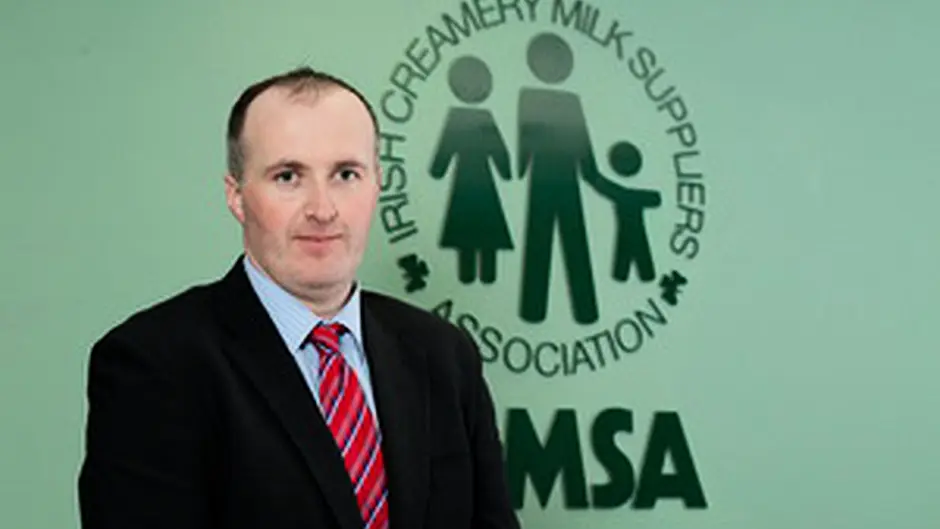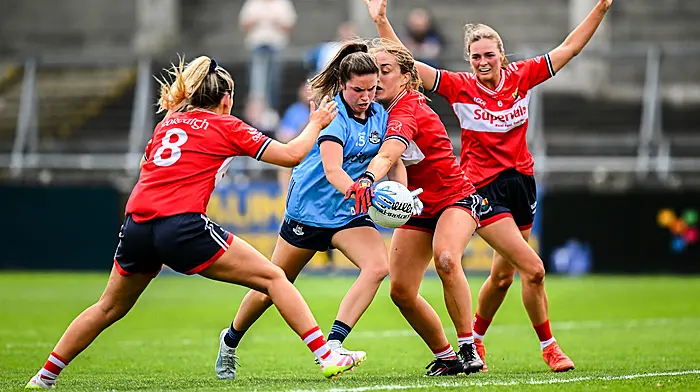THOSE working in farming co-ops in West Cork have yet to experience the 'battering of the rural economy' that the Irish Creamery Milk Suppliers Assocation claims is happening due to the lower post-quota milk prices.
BY KIERAN O’MAHONY
THOSE working in farming co-ops in West Cork have yet to experience the ‘battering of the rural economy’ that the Irish Creamery Milk Suppliers Assocation claims is happening due to the lower post-quota milk prices.
According to ICMSA deputy president Pat McCormack, there has been a total drop in spend of ‘well in excess of €1billion’ nationally compared to last year.
Estimating the spending drop in Cork county – which accounts for a quarter of all the milk produced in the State – at €265m, he warned that current government and EU policy complacency means that these kinds of ‘enormous losses’ could continue into next year.
Pat McCormack said that ICMSA was now working on county-by-county losses based on the volume of the milk produced in that county in 2014 at a price of 38.4 cents per litre and then calculating the same volume at a 2015 price of 28.5 cents per litre with the wider ‘county spend’ calculated on the basis of Professor Alan Mathews’ recommended multiplying factor of 1.8.
Mr McCormack said that, while no one imagined that international dairy markets could be turned around at the click of a finger, he was becoming increasingly alarmed by what he termed the ‘sleepwalking attitude’ being displayed by both the Department of Agriculture, Food and the Marine and, even more so, by the EU Commission and he said that, when the losses are presented on an individual county basis, they become extremely alarming.
Pat Moriarty of Lisavaird Co-Op said the lower post-quota milk price is certainly affecting incomes among its members: ‘We dropped the milk price in June and the outlook is bleak enough at least for the first half of next year, which isn’t looking great. You can also see that capital spending is being curtailed due to fears that incomes will be poor to,’ said Pat.
At Drinagh Co-op Martin O’Mahony said they haven’t seen it in sales yet: ‘We would have seen a greater increase if the farmers had the money as they spend it when they have it, but then the price of milk is down 10c from last year,’ said Martin.
A spokesperson for Bandon Co-op also said that they were maybe not experiencing it at the moment, but that’s always the way when the price was down.
They also said the opportunity to expand was done in April and, when prices start reducing, then the economy will feel it.
Speaking at the recent Tullamore Show, the Minister for Agriculture Simon Coveney admitted that ‘there can be no doubt that softening of global dairy markets has had an impact on dairy farmers in Ireland and throughout the EU and the possibilities remain for this to continue. Farmers and other stakeholders are very much aware that price volatility will be a fact of life from now on, and have taken steps to cope with that volatility.
‘In the short- to medium-term all stakeholders at national and EU level must together face and address challenges such as price volatility utilising all tools at our disposal. Taking a longer-term perspective, the future post-quota abolition is very positive and presents a significant opportunity for Irish dairy farmers,’ said Mr Coveney.
‘The long-term future global fundamentals for the dairy sector remain very positive, with increasing worldwide consumer demand, particularly in the Middle and Far East being driven by population growth as well as growth in the middle classes.’
However, Pat McCormack stated: ‘ICMSA has always urged politicians and policymakers to grasp the basic fact that, where farm incomes take the kind of battering that we’re seeing just now, then not alone does the local economy suffer through falling farm income, but – based on the well-established economic principle of the multiplier effect – you see massive falls in the wider local economy as the farmers stop purchasing goods and services in their local communities.’
Noting the lack of urgency in the EU response of only calling an ‘emergency Farm Council meeting’ for four weeks’ time, Mr McCormack said: ‘We’re going to need help managing that kind of extreme volatility and that’s why we need to see local politicians of all parties get behind the kind of income-smoothing policies ICMSA is urging.’









